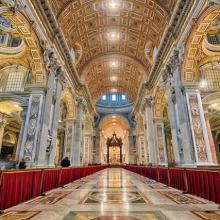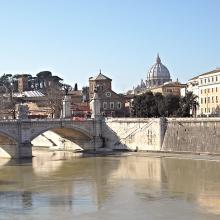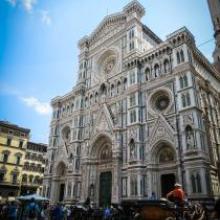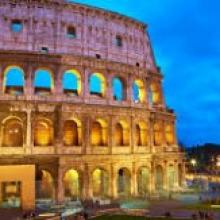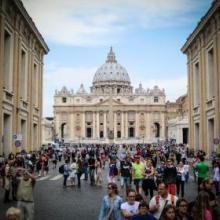Description
Program Description
Fables take root through oral traditions and bloom into literature, sculpture, painting, and film. In ancient Rome, fables also sift into ruins and landmarks, recalling the events, both fair and foul, that transpired there, and sometimes converting mere physical sites into hallowed ground. We’ll explore how Roman sites have been written about and imagined in various ways, from contemporary literary accounts as well as those of major nineteenth-century American writers--including Henry James, Nathaniel Hawthorne, Herman Melville, Edgar Allan Poe, Margaret Fuller, Frederick Douglass and Mark Twain. How do our readings of physical places compare with what widely recognized authors have written about these same sites? With such questions in mind, we will create our own travel vignettes and work with them in a weekly writing studio. As we share these vignettes with one another, we'll build a community of reading, writing and touring. And we'll also have a chance to explore what a group of major American writers discovered in visiting and in commenting on Rome from a trans-Atlantic perspective.
Courses
Credits
15 UW Quarter Credits
Courses
ENGL 363: Literature and The Other Arts and Disciplines: Connecting Literary Texts to Physical Spaces and Artifacts in Rome (5 credits) VLPA
In this literature course, we'll examine the relationships between the work of 19th-century American writers and the arts they reference in Rome: works of painting, sculpture, and architecture which figure prominently in their novels, travel memoirs, diaries, essays, and poems. Beginning with Hawthorne's The Marble Faun, we'll address how Rome emerges across its architecture, art, and ruins as a lamination of multiple histories--a trans-temporal landscape--and in the process we'll explore how immersion in the "eternal city" de-parochializes a point of view too naively situated within its own moment in history. As we pursue our literary study through writings by Edgar Allan Poe, Ralph Waldo Emerson, Margaret Fuller, Herman Melville, Frederick Douglas, Mark Twain, and Henry James, we'll discover how Rome invites hospitality to an open-ended rather than a closed, doctrinaire sense of cultural power.
Learning goals include:
To read 19th Century American literature that references Rome and see how those references layer onto the city itself; To draw connections between texts and physical works of art, architecture, and sculpture To explore the relationship between sense of place, the mutability of culture, and how this is registered in literary texts Course satisfies VLPA requirement and the pre-1900 literary history requirement for English majors.
ENGL 381: Advanced Expository Writing: Exploring Rome Through Writing (5 credits) This is a C or W credit writing course (Composition or Writing Across Curriculum)
Reading, writing and traveling are all acts of the imagination. This course will allow us to "see" the places we're visiting in real time and prepare for the places we plan on visiting. Our workshop will offer the scholar/traveler a way to synthesize her experiences, transforming them into essays, articles, poems or vignettes. Our time together will help to set a practice for writing, and exploring, within a community of other writers so we can have methods to document our experiences by keeping notebook/records of the sights, sounds, smells and impressions of the places we've visited in English 395 and transform these into more formal pieces of writing. By reading poems, stories, essays and articles that illuminate the art of travel and offer contemporary readings of Italy, we'll test out a range of styles and stances. These activities will reveal our initial assumptions about what it means to travel and to write about what we experience by traveling, using writing as a method of inquiry and imagination as well as documentation.
This course meets the Forms and Genres requirement (or English electives) in the English Language and Literature major (for this program only). It may also count toward the composition or additional writing requirement.
Learning goals include:
1) To learn on-the-ground, hands-on strategies of journalistic, creative, and scholarly travel writing; 2) To reflect upon texts by established, literary writers and identify writing strategies to practice; 4) To read, analyze, and synthesize complex texts and incorporate multiple kinds of observation and evidence to generate and support writing; 5) To develop good critical feedback practices with colleagues in order to create a dynamic learning community.
ENGL 395: Study Abroad: Connecting Fables and Spaces in Dialogue, Visits and in Writing (5 credits) VLPA
This course includes an introduction to Italian language and culture, along with excursions to Florence and to local museums and sites. We will also connect literary texts and writing practices to our site visits and use these to produce final projects. Our work will entail: 1) doing intensive research prior to actual on-site visitations; 2) reading selected studies which theorize about the nature of travel and travel writing along with texts which model forth what alert travel--and alert travel writing--entails; 3) participating actively in the tours, recording one's observations, and asking questions of on-site guides; 4) and, finally, debriefing sessions, so to speak, involving oral presentations presented to the group at large, and precipitating group discussion. The work in the course is coordinated with writing practices in ENGL 381, and with readings and seminar discussions required in ENGL 363.
Learning goals include:
1. To glean basic Italian phrases from a short immersion; 2. To connect literary analysis to observations about place and articulating these in prose; 3. To practice collaboration and learning in a non-American setting
Cost
Program Expenses
Estimated Program Fee: $8,190
Included in the program fee:
- $450 Study Abroad Fee
- Instruction
- Housing
- Program activities and program travel
- Airfare (average price subject to when and where your buy your ticket - $1,500)
- Food (about about $40/day)
- UW Student Abroad Insurance ($1.64/day)
- Other health expenses/immunizations
- Personal spending money
Payment Due Date: October 11, 2019
Program fees will be posted to your MyUW student account and can be paid the same way that you pay tuition and other fees. Check your MyUW Account periodically for due dates.
Financial Aid
- A large percentage of UW students utilize financial aid to study abroad. Most types of financial aid can be applied to study abroad fees.
- You can submit a revision request to increase the amount of aid for the quarter you are studying abroad. These additional funds are usually awarded in the form of loans. To apply, fill out a revision request form, attach the budget sheet (available via the link at the top of this brochure) and submit these documents to the Office of Student Financial Aid. For more information about this process, consult the Financial Aid section of our website.
- Consult the Financial Aid section of our website for more information on applying for financial aid, special considerations for summer and early fall programs, and budgeting and fundraising tips.
Scholarships
- There are many scholarships designed to fund students studying abroad. The UW Study Abroad administers a study abroad scholarship program and there are national awards available as well.
- Scholarships vary widely in their parameters. Some are need-based, some are location-based, and some are merit-based.
- To be considered for a UW Study Abroad Scholarship fill out a short questionnaire on your UW Study Abroad program application. You must apply by the priority application deadline for the program in order to be considered for a scholarship. Click the Overview tab to view application deadlines.
-
Consult our Scholarships page to learn about UW-based and national scholarships. The Office of Merit Scholarships, Fellowships, and Awards can help you learn about additional opportunities.
Budgeting Tools
We understand that figuring out your finances for study abroad can be complicated and we are here to help. Below are some ways to find additional support.
- Click on the Budget Sheets link at the top of this brochure to view the estimated budget of all expenses for this program.
- Contact the Global Opportunities Adviser at goglobal@uw.edu to learn more about how to pay for study abroad.
- Attend a Financial Planning Workshop offered by UW Study Abroad – more information is on the Events page of our website.
- Visit the Finances section of our website.
Dates & Deadlines
Important Dates
- Information Session: Tuesday February 12th at 3:30 pm held in Allen auditorium (located in Allen library, ground floor, north wing, room G81L)
- Application Deadline: February 15th, 2019
- Required Seattle Pre-Departure Orientations: First and second English Dept mandatory in-person orientation is TBD Bin Allan Library Auditorium in SPR19.
- First Day of the Program (in Seattle): September 26th, 2019; All students will be required to meet in person and begin their Rome studies together as a group (though departure is the following week).
- Arrival in Rome: October 3rd, 2019
- Last Day of the Program: December 6th, 2019
- Students depart their Rome apartments and fly back to Seattle (or elsewhere): December 7th, 2019
Pre-Departure Orientations
Participants will be required to attend a total of three hours of pre-departure orientations in Seattle during Spring Quarter. Two English Department led pre-departure sessions will be 1.5 hours each: Orientation #1 is TBD SPR 2019; Orientation #2 is TBD SPR 2019; Both sessions will be held in Allen Library Auditorium.
In addition to the orientations given by the UW English Department, program participants must also complete an online pre-departure orientation facilitated by the Study Abroad office.You must register for this orientation through your online study abroad account in order to attend scheduled orientations. You can visit the Orientation section of the Study Abroad website to view the current orientation schedule. The general Study Abroad orientation must be completed prior to August 1, 2019.
Any problems or financial losses that occur as as a result of not attending the orientations are entirely the responsibility of individual students.
Passports and Visas
Please carefully review the UW Study Abroad Rome Center's information on Passports and Visas: http://www.washington.edu/studyabroad/students/before-you-go/travel-documentation/
We will assist students with this process in any way we can, but please remember that we are not immigration experts. Obtaining a passport (required) and visa (should you need one) is your responsibility.
Amy Feldman-Bawarshi
Academic Adviser
